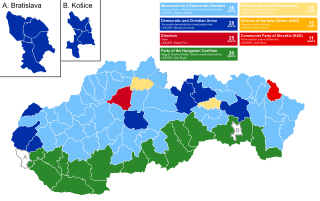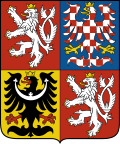The Freedom Union–Democratic Union was a small pro-European liberal party in the Czech Republic from 1998 to 2011.

The Liberal Party of Macedonia is a conservative-liberal political party in North Macedonia. The party was a member of the Alliance of Liberals and Democrats for Europe Party but is no longer a member. It is currently led by Ivon Velickovski.

Parliamentary elections were held in Poland on 21 September 1997. In the Sejm elections, 47.93% of citizens cast their votes, 96.12% of which were counted as valid. In the Senate elections, 46.92% of citizens cast their votes, 97.82% of which were valid.
The Democratic Party is a centre-right political party in Bulgaria led by Alexander Pramatarski. The party was a member of the European People's Party (EPP).

Parliamentary elections were held in Slovakia on 20 and 21 September 2002. The Movement for a Democratic Slovakia remained the largest party in the National Council, winning 36 of the 150 seats. Mikuláš Dzurinda of the Slovak Democratic and Christian Union remained Prime Minister, in coalition with the Party of the Hungarian Coalition, Christian Democratic Movement, and Alliance of the New Citizen parties.

Parliamentary elections were held in Macedonia on 18 October 1998, with a second round on 1 November. VMRO-DPMNE emerged as the largest party, winning 49 of the 120 seats, and later formed a coalition government with Democratic Alternative and the Democratic Party of Albanians.

Parliamentary elections were held in Serbia on 21 January 2007 to elect members of the National Assembly. The first session of the new National Assembly of the Republic of Serbia was held on 14 February 2007. The elections enabled the coalition of DS; DSS & G17+ to continue.

Parliamentary elections were held in Hungary on 25 March 1990, with a second round of voting taking place in all but five single member constituencies on 8 April. They were the first completely free and competitive elections to be held in the country since 1945, and only the second completely free elections with universal suffrage in the country's history. The conservative, nationalist Hungarian Democratic Forum (MDF) beat the liberal and more internationalist Alliance of Free Democrats, which had spearheaded opposition to Communist rule in 1989, to become the largest party in parliament. The Hungarian Socialist Party, the former Communist party, suffered a crushing defeat, winning only 33 seats for fourth place.

Parliamentary elections were held in Poland on 21 October 2007, after the Sejm voted for its own dissolution on 7 September. The election took place two years before the maximum tenure of four years, with the previous elections having been in September 2005. The early elections were a result of serious allegations of massive corruption on the part of Andrzej Lepper, leader of the Self-Defense of the Republic of Poland, whose party served as a junior coalition partner to the government of Prime Minister Jarosław Kaczyński. All 460 seats in the Sejm and all 100 seats in the Senate were up for election.

Senate elections were held in the Czech Republic on 20 and 21 October 2006, with a second round on 27 and 28 October. The result was a victory for the Civic Democratic Party, which won 41 of the 81 seats. Voter turnout was 41% in the first round and just 21% in the second.
General elections were held in Bosnia and Herzegovina on 12 and 13 September 1998. Voter turnout was 67.99% in the parliamentary election and 67.87% in the presidential election.

Federal elections were held in Czechoslovakia on 5 and 6 June 1992, alongside elections for the Czech and Slovak Assemblies. The result was a victory for the Civic Democratic Party–Christian Democratic Party (ODS-KDS) alliance, which won 48 of the 150 seats in the House of the People and 37 of the 150 seats in the House of Nations. Voter turnout was 84.7%.

Senate elections were held in the Czech Republic for the first time on 15 and 16 November 1996, with a second round on 22 and 23 November. the first after independence. The result was a victory for the Civic Democratic Party, which won 32 of the 81 seats. Voter turnout was 34.9% in the first round and 30.6% in the second.

Senate elections were held in the Czech Republic on 12 November 2000, with a second round on 19 November. The result was a victory for the Civic Democratic Party, which won 22 of the 81 seats. Voter turnout was 33.4% in the first round and 21.5% in the second.

Senate elections were held in the Czech Republic on 25 and 26 October 2002, with a second round on 1 and 2 November. Voter turnout was just 24.1% in the first round and 31.7% in the second.

Senate elections were held in the Czech Republic on 5 and 6 November 2004, with a second round on 12 and 13 November. The result was a victory for the Civic Democratic Party, which won 37 of the 81 seats. Voter turnout was 28.6% in the first round and just 18.4% in the second.

General elections were held in Macedonia on 16 October 1994 to elect a President and Assembly, with a second round of Assembly elections on 30 October. The presidential election was won by Kiro Gligorov of the Alliance for Macedonia, whilst the parties forming Alliance for Macedonia also won the Assembly elections with 95 of the 120 seats. However, the second round of the Assembly elections were boycotted by VMRO-DPMNE and the Democratic Party, as they claimed there had been irregularities in the first round.
General elections were held in Romania in July 1932. The Chamber of Deputies was elected on 17 July, whilst the Senate was elected in three stages on 20, 24 and 26 July. The result was a victory for the governing National Peasants' Party-German Party alliance, which won 274 of the 387 seats in the Chamber of Deputies and 104 of the 113 seats in the Senate elected through universal male vote. Of the 274 Chamber seats, 265 were taken by the National Peasant's Party and nine by the German Party.

The National Liberal Party was a political party in Bulgaria.

The Social Democratic Alliance of Moldova was a political party in Moldova.












